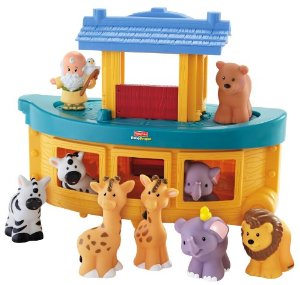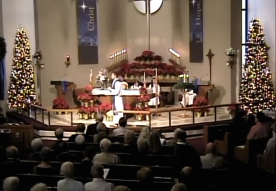 Does anyone else connect Noah’s Ark with Christmas? I do…mostly because I remember giving a toy Noah’s Ark to our daughters for Christmas one year. And, each year that cute Noah’s Ark ornament finds its way to the family Christmas tree.
Does anyone else connect Noah’s Ark with Christmas? I do…mostly because I remember giving a toy Noah’s Ark to our daughters for Christmas one year. And, each year that cute Noah’s Ark ornament finds its way to the family Christmas tree.
The fact that this portion of mankind’s history has become a sentimental children’s story is interesting. Somehow, lots of cuddly animals on a family boat trip, culminated by a rainbow … these tender images have pretty much trumped the specter of the global holocaust that was going on under the waters.
We have the tendency to do the same thing with the Second Coming of Christ. Do we long for it? Of course! But, in it’s tow will be devastation the likes of which the world has never seen. Personally, I don’t long for that.
Today’s text from 1 Peter references the flood.
“God’s patience waited in the days of Noah, while the ark was being prepared, in which a few, that is, eight persons, were brought safely through water. Baptism, which corresponds to this, now saves you, not as a removal of dirt from the body but as an appeal to God for a good conscience, through the resurrection of Jesus Christ” (1 Pet. 3:20-21).
Sinful men, the patience of God, the covenant between God and His elect established, the impending judgment, and the salvation of the remnant. These are descriptors for both the days of Noah and these “last days” before the return of Christ. The season of Advent drives us into this connection, and to acknowledge the gravity of our times.
 Martin Luther’s words help here: “As it happened when Noah was preparing the ark, so it takes place at present … As he had regard to himself and was saved in the ark which swam upon the waters, so must you also be saved in baptism… we sail in the ark, which means the Lord Christ, or the Christian church, or the Gospel that Christ preached, or the body of Christ to which we cling by faith, and are saved as Noah was in the ark … where there are now those who cling to Christ, there is surely a Christian church.”
Martin Luther’s words help here: “As it happened when Noah was preparing the ark, so it takes place at present … As he had regard to himself and was saved in the ark which swam upon the waters, so must you also be saved in baptism… we sail in the ark, which means the Lord Christ, or the Christian church, or the Gospel that Christ preached, or the body of Christ to which we cling by faith, and are saved as Noah was in the ark … where there are now those who cling to Christ, there is surely a Christian church.”
Not to get way off on baptism here – but Jesus commanded us to go into the world and baptize. This ancient initiation rite, infused with divine efficacy and depth of meaning by Jesus and his disciples, is an indispensable part of God’s gospel plan. It has always been understood as the official “embarkation” onto the ark – which Luther equates to Jesus/the Church/the Gospel all in one!
There is, however, a striking difference between Noah’s ark and today’s church: God has called today’s “Noah” to go into the highways and byways, and seek passengers for the ark of salvation before the deluge begins! Each day God’s patience delays the second coming means salvation for many (2 Pet. 3:9). But the flood waters are coming. Our advent focus should heighten our urgency to share the evangel-invitation to the world, that they, too, may be baptized onto the passenger list.
So, when you see a cute little Noah’s Ark this holiday season, think a bit about the underwater reality of that story, and let it motivate you to prepare for His coming!
E * O





